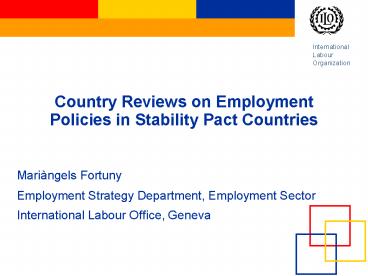Country Reviews on Employment Policies in Stability Pact Countries - PowerPoint PPT Presentation
1 / 12
Title:
Country Reviews on Employment Policies in Stability Pact Countries
Description:
Country Reviews on Employment Policies in Stability Pact Countries Mari ngels Fortuny Employment Strategy Department, Employment Sector International Labour Office ... – PowerPoint PPT presentation
Number of Views:131
Avg rating:3.0/5.0
Title: Country Reviews on Employment Policies in Stability Pact Countries
1
Country Reviews on Employment Policies in
Stability Pact Countries
- Mariàngels Fortuny
- Employment Strategy Department, Employment Sector
- International Labour Office, Geneva
2
Background
- South East European Ministerial Conference on
Employment (Bucharest, October 2003) - Bucharest declaration
- Preparing integration into the EU
- Implementing Council of Europe standards in
employment matters - Making operational core elements of ILO Global
Employment Agenda - ILO and Council of Europe requested to provide
guidance and support
3
- Employment Ministers approve and update
cooperation objectives Permanent High Level
Committee (PHLC) designs and supervises programme
of activities - PHLC has set up two working groups
- WG 1 under ILO guidance, reviews national
employment policies - WG 2 under Council of Europe guidance, reviews
performance of employment services - Main objective guide tripartite constituents in
assessing national employment policy - ILO project on promoting gender equality
4
Main activities
- In-depth analysis and assessment
- Country reviews of employment policy (CREPs)
based on National Reports produced by ministries
of labour after consultation with the social
partners - National Reports submitted to ILO and CoE for
assessment. Based on comments a CREP is produced - Bulgaria Romania have already prepared JAPs
their experience is source of inspiration - Draft CREPs discussed at WG 1 and 2 of PHLC and
National Tripartite Conferences and then finalized
5
- Organization of Peer Reviews
- Countries which do not prepare a CREP in the
respective year, prepare an annual national
policy report - The two CREP countries and Bulgaria and Romania
assess the remaining countries - Peer Reviews take place during the meetings of
Working Groups I and II - Capacity building is undertaken
- ILO and CoE work with policy makers social
partners - Active role of social partners in design and
implementation of employment policies - Peer reviews mutual learning
6
- Technical assistance by the ILO and CoE
- Provision of guidelines, advisory services
- Report findings and policy conclusions discussed
in National Tripartite Conferences - Assistance in reflecting recommendations into
policies - Monitoring, evaluation and reporting
- PHLC reports at Ministerial Conferences
- At end of project ILO will prepare report with
policy conclusions, achievements and lessons
learned to be discussed at sub-regional conference
7
- Progress of the project
- CREPs 2004 Albania and Croatia NTCs took place
in the first half 2005 and draft CREPs finalized - PHLC, January 2005, Strasburg, to discuss Albania
and Croatia CREP and peer reviews of Moldova
(Bulgaria) and Bosnia Herzegovina (Romania). - CREPs 2005 Moldova and Serbia
- Mid term Ministerial Conference, Sofia, autumn
2005
8
- Albania CREP
- First country to commit itself to have its
employment policy assessed - CREP highlights main challenges facing Albania
regarding the labour market and provides set of
recommendations - It aims to contribute to the implementation of,
inter alia, ILO Convention No.122 (1964) on
Employment Policy as well as implementing ILO
Global Employment Agenda - It aims to help preparations for future
integration in the EU by converging towards
Guidelines of the European Employment Strategy
9
- Albania CREP main conclusions
- Despite successful macro indicators, high
unemployment, large informal sector, mass
emigration - Call for policy integration macroeconomic policy
for growth and employment - NSSED step forward towards integrating economic
and social policies - Activating labour market policies
- ALMPs should be carefully targeted
- Relevance and quality of ALMPs should be
regularly assessed - Avoid gender stereotyping
- Involvement of social partners crucial for its
success
10
- Albania CREP main conclusions
- Improve performance of employment services
- Importance of training the staff of employment
offices - Tailored services to job seekers should be
provided - Need to extend activities to rural areas
- Business climate conducive to enterprise
development - Sound financial and technical infrastructure to
attract FDI - Increase competitiveness of SMEs is crucial SME
Agency is an important development - Further efforts are necessary for shifting
informal enterprises into the formal sector
11
- Albania CREP main conclusions
- Strengthening social dialogue key to a well
functioning labour market - Need to strengthen role and functioning of
tripartite bodies - Adequate social protection system
- ALMPs and social protection measures mutually
consistent and supportive - Improving data collection
- Overall capacity of the statistical system
seriously deficient - Labour force surveys should become part of the
national statistical system
12
- First peer review, second meeting of PHLC,
January 2005, Strasbourg - Review of Moldova (Bulgaria) and
Bosnia-Herzegovina (Romania) - Basic principles learning, sharing,
strengthening networks and building capacity were
satisfied - Wish to establish further bilateral exchanges
- Need to improve statistical indicators
- Call for policy integration and coordination
- Important to tackle employment issues at national
and regional levels - Balance flexibility and security































